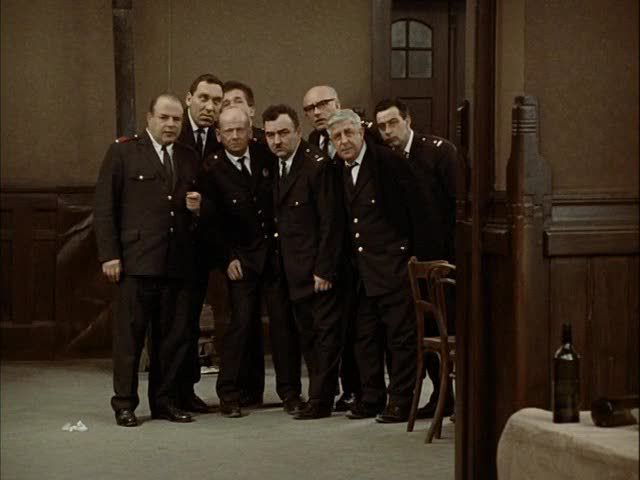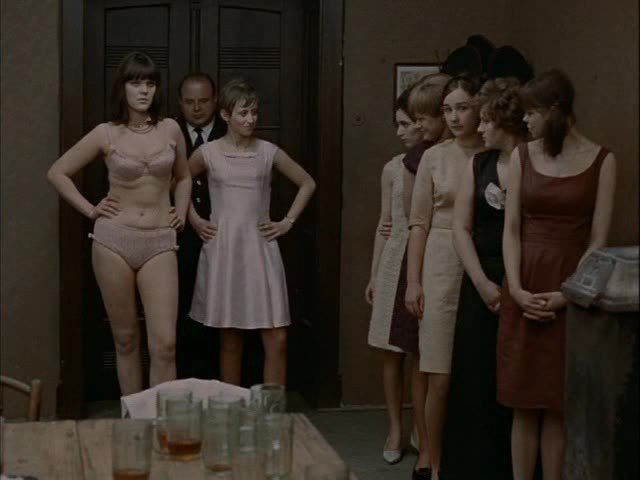
Made just before he left Czechoslovakia for the US, The Firemen's Ball was director Miloš Forman's first color film, his final film in his native country, and also the reason he had to leave his country in order to continue making films. It's easy to see why. The film is, quite obviously to both modern audiences and, apparently, Czech censors, a thinly veiled critique of the Czech Communist Party and, more audaciously, of the very idea of collective action that underpins socialism. This is a deadpan, hilarious satire, documenting a single night at a small-town party organized by the local fire brigade, honoring their retiring chairman on his eighty-sixth birthday (they missed honoring him on the more meaningful eighty-fifth, a year earlier, in the first of many fumbles committed by this incompetent assemblage). From the very beginning, even before the credits, Forman sets the scene for the idiocy to come, as the firemen accuse each other of stealing the prizes from the night's lottery fund, and set fire to the banner that was to hang above the hall during the ball. The fact that they're unable to even operate the equipment to put out this small-scale blaze is both the first comment on the extent of their incompetence and a bit of foreshadowing for the film's surprisingly poignant climax.
Of course, things only get worse from here. These are men who can manage to screw up the process of selecting beauty contest participants in what seems to be a ballroom positively crammed with attractive young women. Their chosen finalists are either aggressively plain or exaggeratedly awkward, like the girl who pads her bra to such an extent that her dress seems to be held away from her body on tent posts. Forman simply lets absurd scenarios like this play out in natural ways, sticking with this anonymous and ridiculous committee as they bungle their way through every aspect of the party's planning. Over the course of the evening, the table piled high with lottery gifts is slowly emptied by multiple (and unseen) thieveries, young couples copulate under tables, the chairman seems senile and lost, and keeps executing a slow, stately walk towards the stage at completely inappropriate moments, and the beauty contest itself falls apart, in one of the film's most hysterical scenes, when the contestants all get cold feet and begin fleeing.
Forman stages all this in an atmosphere of rapidly escalating chaos, as the party spirals completely out of control. His camera is intimate, casual, and perfectly attuned to the spirit of anarchic insanity running throughout this room. Indeed, Forman often seems to be taking gleeful pleasure in the lunacy going on everywhere. His mise en scène encompasses, essentially, two different visions of collectivity: the ordered committee action of the party organizers, and the wild, unfettered anarchy of the party itself. For Forman, both of these possible outcomes are equally absurd, and both are clearly tied to aspects of Communist society — just as the fire brigade stand in for the Communist Politburo, the partygoers are the proletariat, trapped within an absurd situation with absurd leaders, and forced by these circumstances to act in dishonest and despicable ways. This is a system that privileges dishonesty. Confronted with the fact that all the lottery prizes have been stolen, the fire committee decides that the people who didn't steal will just have to think of it as if there was a lottery and they didn't win. After all, everyone bought tickets; those who stole the prizes were simply the winners. When one of the committee members has an unusual attack of guilt and is caught attempting to return a stolen prize, his comrades are angry at him, not for stealing (that's expected), but for trying to return the prize, thus damaging the reputation of the fire brigade.

Forman's framing of the fire brigade inevitably enforces the point that they are nominally in charge but crippled by their indecisiveness, incompetence, and corruption. The group is almost always photographed together, seldom with the members isolated from one another for any length of time — the exception is when the one member has his moment of repentance. Most of them are not even given names. They are anonymous figureheads, an idealized group that acts together with no trace of individuality. Or so goes the Communist theory, Forman seems to be saying wryly. In practice, his head-on depictions of these men, massed into groups, projects an image exactly the opposite of the unity and collective action that is the ideal of socialist politics. As they cluster into tight formations, staring tentatively and fearfully at the camera, they look lost, like scared individuals trying to hide within the safety of a larger group. Forman's perspective, his deadpan camera angles and his objective distance from the assembled old men, gives them a pathetic quality that's heightened, not lessened, by their collectivity. It's this subversive questioning of collective action that is most radical in Forman's film, and is probably what the Czech censors responded to the most ferociously, even if it only registered with them subconsciously.
Not that "the people" make out any better here. The leadership may be idiotic, but the people they're leading are stubborn, unwilling to be led, and forthrightly dishonest. If Forman's vision of committee leadership is marked by its static angles and clustered compositions, his party scenes have a wildness and spontaneity that presents the reverse of this rigidly absurd group leadership. These scenes are chaotic accumulations of bodies whirling and flying past, often broken down so that only body parts can be seen. Individual shots focus on the legs of the dancers, or their arms and torsos in the midst of a frenetic riot, or their amassed heads in a sea as they listen to a speaker on stage. Best of all is the complete breakdown of order that accompanies the beauty contest, as the contestants run away and the crowd quickly degenerates into chaos, with crowds of guys attempting to corner the women and drag them on stage, throwing girls over their shoulders, even roping in girls who hadn't been in the contest to begin with. It's a masterpiece of completely unrestrained society, "the people" breaking loose of their inept masters and having fun watching the destruction of their social order. But Forman's editing in this scene is also surprisingly crisp, his images maintaining the perfect economy of his more structured compositions even when the stampeding revelers seem to be disrupting any semblance of order. Forman's portrait of disorder is perfectly conceived, achieved with a natural sense for visual rhythms and purely visual humor.
The Firemen's Ball is a delightful film, but also a film with a very serious heart beating beneath its surface humor. As the film's climax reveals, the incompetence of the fire brigade, which seems so comical in the context of a disastrous party, can also have serious consequences when applied to real world matters. When these bumblers are placed in charge of not a beauty contest but of public safety, the true extent of their bumbling, and its horrifying results, becomes readily apparent. This is why the sequence of the old man's house burning, placed where it is within the film, is so heartrending. As Forman cuts precisely back and forth between shots of the consuming, brilliant fire and the emotional faces of the observing crowd, the hopeless non-efforts of the firemen to extinguish this blaze are not funny, but incredibly depressing. The same could be said of the later scene where the committee members even bungle the presentation of an award to their former chairman, who is now dying of cancer. This old man's quiet dignity and patience in the face of the evening's many disasters make a mockery of the committee's ham-fisted attempts to honor him. A decent man in a corrupt system, he is entirely out of place here, and he becomes a victim as a result. This is a hilarious film, but its humor is cut with bitter satire, with a deep disgust for the absurdities of the political system of Czechoslovakia at the time.





4 comments:
Terrific post, Ed. I was stuck by the glee with which one of the fire brigade noticed the fire alarm sounding. He seemed so eager to go into action and prove he could do something right. Alas.
Thanks Marilyn. The fact that the fire brigade is completely oblivious to their own incompetence definitely adds to the humor.
I just watched another Czech New Wave film, Daisies. In it, two girls wreck havoc with childish glee. It's interesting that the director, Vera Chytilová, hoped to show that large-scale destruction starts with everyday acts of vandalism and humiliation of others. I think this tracks well with the Communist criticisms of The Firemen's Ball as insulting to the proletariat. Interestingly enough, the film was excoriated for being too avant garde (actually called "trash"), thus making it too hard for the workers to understand.
I'm going to review the film on Ferdy in a day or two.
I've heard of that film, it's always sounded intriguing but I haven't gotten around to it yet.
It's interesting to me that, in general, so many movements that claim to be for the "common man" have such a dim view of his intelligence and sophistication. The Soviets had a brief era when they were very accepting of the socialist avant garde, with Eisenstein etc, and then they decided that this kind of film was too complicated for the proletariat to understand. You would think that a movement that claims to be in favor of the common man wouldn't resort to force-feeding the people dumbed-down propaganda instead of complex art. Just one of many ways in which the reality fails to measure up to the ideal.
Post a Comment